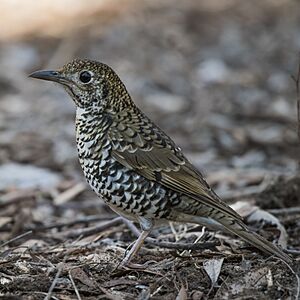Bassian thrush facts for kids
Quick facts for kids Bassian thrush |
|
|---|---|
 |
|
| Bassian thrush at Australian National Botanic Gardens, Canberra, Australia | |
| Conservation status | |
| Scientific classification |
|
| Kingdom: | Animalia |
| Phylum: | Chordata |
| Class: | Aves |
| Order: | Passeriformes |
| Family: | Turdidae |
| Genus: | Zoothera |
| Species: |
Z. lunulata
|
| Binomial name | |
| Zoothera lunulata (Latham, 1801)
|
|
| Subspecies | |
|
|
| Script error: The function "autoWithCaption" does not exist. | |
Script error: No such module "Check for conflicting parameters".
The Bassian thrush (Zoothera lunulata) is a cool bird found in Australia. It's also known as the olive-tailed thrush. This medium-sized bird loves to eat insects.
You can find the Bassian thrush in many parts of Australia. It lives from northern Queensland all the way to southeastern Australia. You can also spot it in Tasmania and on some islands. These thrushes are about 27 to 29 centimeters (11 to 11.5 inches) long. They usually weigh around 100 grams (3.5 ounces).
Contents
Where Bassian Thrushes Live
Bassian thrushes make their homes in different places. They like shrubland, thick forests, and rainforests. These birds usually stay in one area. However, some might travel around during the non-breeding season. Even though people sometimes change their habitats, these birds live across such a large area that they are doing well.
What Bassian Thrushes Look Like
The Bassian thrush has beautiful colors. Its feathers can be brown or an olive green. It has a clear white ring around its eyes. You'll also see black bars on its back, rear, and head. The underside of its body is lighter. It has dark, wavy patterns there. Its wings also have a dark bar underneath.
How Bassian Thrushes Find Food
Bassian thrushes are clever hunters. They often look for food in piles of leaves. They disturb the leaves to make insects move. Then, they quietly listen for the sounds of their prey. This helps them find tasty bugs to eat.
Bassian Thrush Nests and Eggs
Bassian thrushes start building their nests in winter. This can be as early as late June. They continue nesting until the end of summer. A female thrush usually lays two or three eggs. The eggs can be pale green, blue, or a light stone color.
The nest is shaped like a cup. It's often made from strips of bark and leaves. The inside is lined with soft grasses and small roots. Thrushes build their nests in different spots. They can be a few feet off the ground or as high as 50 feet. They often choose a fork in a tree. Sometimes, they might build a nest on a tree stump or a ledge in a cave.
Gallery
-
Bassian thrush at Australian National Botanic Gardens, Canberra
-
Bassian thrush at Southwest National Park, Tasmania
-
Bassian thrush at Bruny island, Tasmania
 | Toni Morrison |
 | Barack Obama |
 | Martin Luther King Jr. |
 | Ralph Bunche |





